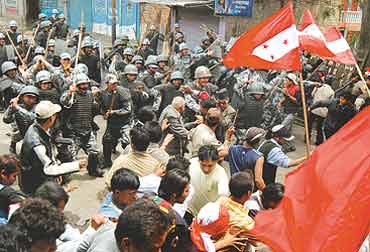
|
|
|
|
|
|
|
|
|
|
|
|
|
|
||
|
|
||||
|
|
|
King Jnanendra bows down to Nepalese mass demands, but Nepal is still burning Published on May 03, 2009
After continuous not less than two week long mass movement and mass agitation against the King Jnanendra´┐Żs monarchic rule organized by 7-party political alliance that included various sections of Nepalese Congress, Communist Party and other pro democratic political parties except the so called Maoists, that defied police actions including imposition of Curfew, firing, tear gas shelling and rubber bullets and severe lathi charge, the Nepalese king in order to pacify the mass, in a radio broad cast on Friday, April 21, 2006, declared to transfer power to people´┐Żs representatives thus paving the way to democracy. The king asked the 7-party alliance to suggest a name of a PM from among them so that process of transfer of power could start. He promised to transfer power to the 7-party nominated PM in soonest possible time. In his address to the nation the King opined that in Nepal a multiparty democracy would operate within the framework of monarchism. He remarked that he, as a descendant of Shah royal family of Nepal, would have confidence in constitutional monarchism if people want it. If his proposal is accepted, he believes that peace and law & order would then return to Nepal. Hinting to the Maoists the king said that if they return to peace and participate in the election peace would be strengthened. On Thursday police firing that defied curfew killed three agitators.
Opposition 7-party rejected King´┐Żs Proposal
The 7-party alliance of Nepal rejected King´┐Żs call to submit name of a PM to whom the King promised to transfer power soonest possible time. The move on the part of the King was termed as a clever one directed to hold a manipulated election in his favour to retain monarchism with executive power. Rejecting the royal plan of transferring power to peoples´┐Ż representatives, the alliance promised to continue anti King movement with a view to abolishing monarchism from Nepal. The curfew was re imposed once again from Saturday to keep the mass from the street. But mass continues to defy curfew, once again two were killed today (April 23, 2006) in police firing. Even thousands of peasants at different localities outside Katmandu demonstrated against the King´┐Żs rule in favour of democratic rule. It seemed the anti King movement is now spreading rapidly even in the rural areas with greater and greater momentum. The 7-party alliance today demanded for constitutional change terming royal plan as vague and insufficient, and so unacceptable to them. The Communist leader Prodip Nepal the proposal of the king even did not touch the periphery of the 7-party demands. The issue is now whether monarchism in its present form should continue. The leaders called for a total abolition of monarchism and asked the people to continue mass movement till the democracy is restored. The leaders also urged the king to bring in the Maoists in the discussion table.
Although the 7-party alliance termed royal plan of transfer of power as vague and inadequate, they are also not clear about their demands. If one reads the comments of different party leaders of the alliance one may summarize those as:
The extreme view on the issue of role of King in future democratic set up may be stated as follows by one street agitator, ´┐Żwe will turn down the crown and we will run the country´┐Ż, which is the view of CPN and Maoist extremists. On the other hand it appears that majority of the political parties in the alliance are not in favor of total abolition of monarchism; rather they want a constitutional and titular monarchism with practically no executive power as in UK or other European Countries. The monarchism is a traditional and historic institution attached to it perhaps Nepalese people´┐Żs sentiment.
The main burning question of today ´┐Żwill the fate of King Jgnanendra would be decided at the street or in a negotiating table´┐Ż where all political parties including the Maoists will take part and arrive at a decision that will reflect peoples´┐Ż aspiration, will and sentiment. The Indians and the USA want it should be settled in a negotiating table where King will give up his powers and agree with the opposition demands. And in this direction these two counties are exerting pressure on the King.
The event of Nepal should be an eye opener to all autocratic power holders including our great Bangladeshi PM that people are the ultimate decider of the fate of a ruler, whether he is a monarch or she is a democratically elected PM ! Amen.
Prof. Ajoy K. Roy, is a reputed scientist and human rights activist from Bangladesh
|
|
|
|
|
|
|
||
|
|
||||
|
|
|
|
|
